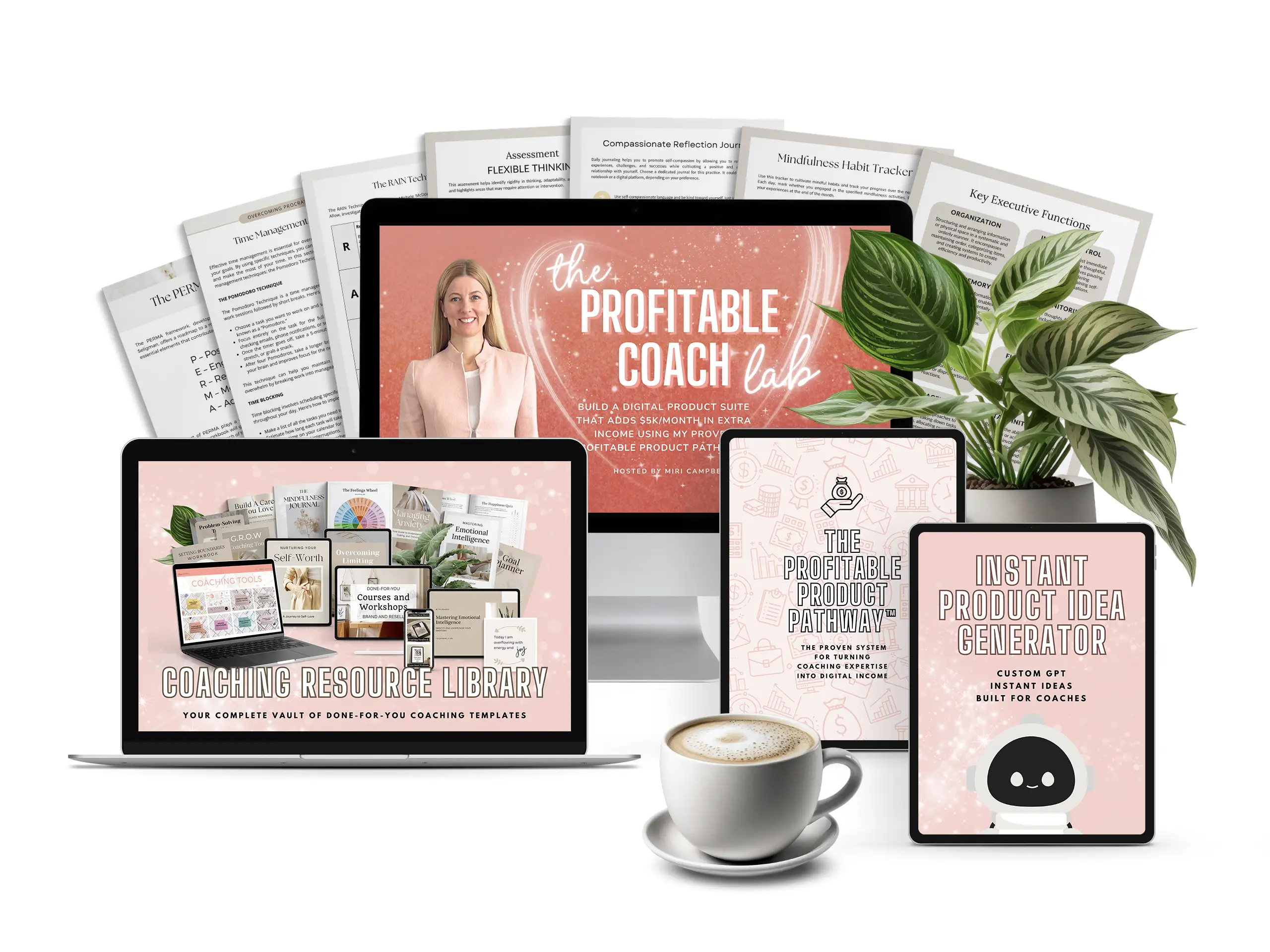7 Tested Coaching Questions To Make Your Coaching Sessions Awesome

7 Coaching Questions
We understand the importance of asking thought-provoking questions that help our clients gain clarity, unlock their potential, and achieve their goals.
Here, I’ll share with you seven coaching questions that you can use with clients in coaching sessions.
Plus, I’ll provide a free worksheet with these questions, allowing you to start using these questions right away with your coaching clients. Let’s get started!
1. What does success look like for you in this situation?
This question allows your clients to visualise their desired outcome and articulate what success means to them.
By clarifying their goals, you help them to focus their efforts and create a clear path forward.
It also helps in setting benchmarks and tracking progress along the coaching journey.
When you ask this question, you open the door to a world of possibilities for your clients. Here’s why this is so valuable:
Clarity and Focus:
By asking about their vision of success, you guide your clients to gain clarity about what they want to achieve.
Motivation and Inspiration:
Defining success ignites a sense of motivation and inspiration within your clients. It sparks their passion and fuels their desire to pursue their dreams.
Goal Setting and Action Planning:
Once your clients have a well-defined vision of success, they can effectively set goals and create action plans. Knowing the destination allows them to map out the journey.
Progress Tracking:
The question of success provides a benchmark against which your clients can measure their progress. As they move forward, they can evaluate how closely they are aligning with their vision and make adjustments if necessary.
Fulfillment and Satisfaction:
When your clients achieve their definition of success, they experience a deep sense of fulfillment and satisfaction. By exploring what success means to them, they tap into their values, passions, and purpose.
2. What is the biggest challenge you’re currently facing?
This is a coaching question that invites your clients to identify and articulate the primary obstacles or hurdles they are encountering in their lives.
This question encourages self-reflection and opens up a space for them to explore and address the underlying issues that may be hindering their progress.
Here’s why diving into their biggest challenge is so valuable:
Self-Awareness:
By asking about their biggest challenge, you prompt your clients to reflect on their current situation and gain a deeper understanding of the obstacles they are facing.
Problem Identification:
Identifying the biggest challenge enables your clients to define the problem clearly. It moves them from a vague sense of frustration to a specific issue that needs to be addressed.
Goal Alignment:
Understanding the biggest challenge helps your clients evaluate whether it aligns with their desired goals and aspirations. It allows them to assess whether they are investing time and energy in things that matter to them.
Barrier Exploration:
Exploring the biggest challenge brings awareness to the barriers that your clients are facing. These barriers may include limiting beliefs, external circumstances, lack of resources, or personal insecurities.
Solution Generation:
Once the challenge is identified, you can help your clients generate potential solutions. By exploring various perspectives and considering different approaches, you empower them to think creatively and expand their problem-solving skills.
Empowerment and Growth:
As they confront their obstacles head-on, your clients develop resilience, courage, and a growth mindset. By supporting them through the process, you help them build the confidence and skills needed to face future challenges successfully.
3. How does this situation align with your core values and priorities?
This is a coaching question that prompts your clients to examine the connection between their current situation and the fundamental principles and priorities that guide their lives.
It encourages them to reflect on whether their actions and choices are in harmony with what truly matters to them.
Here’s why exploring this alignment is important:
Self-Reflection and Authenticity:
Asking about the alignment with core values and priorities invites your clients to look into their inner selves. It encourages them to connect with their true desires, beliefs, and principles.
Values as a Compass:
Core values serve as guiding principles that shape our lives. By exploring the alignment between the situation at hand and their core values, your clients can assess whether they are staying true to their beliefs and principles.
Priority Evaluation:
Understanding how the situation aligns with their priorities allows your clients to evaluate the significance and urgency of addressing it.
Decision-Making Clarity:
Examining the alignment with core values and priorities provides a framework for decision-making. Your clients can assess whether a particular course of action supports their values and long-term vision.
Inner Fulfillment:
When your clients align their actions with their core values and priorities, they experience a deep sense of fulfillment and satisfaction.
Course Correction:
If the situation is found to be misaligned with their core values and priorities, it presents an opportunity for course correction.
4. What resources, skills, or support do you need to move forward?
This coaching question prompts your clients to assess the resources and support necessary to progress toward their goal.
It encourages them to identify any potential gaps and consider how they can acquire the tools and assistance needed for success.
Here’s a closer look at the significance of exploring these aspects:
Resource Identification:
Encourage your clients to identify the specific resources they require to move forward. Resources can include tangible assets like finances, equipment, technology, or access to certain information or expertise.
Skill Assessment:
Ask your clients to evaluate the skills they currently possess and those that are essential for their goal. Identifying any skill gaps allows them to focus on acquiring or honing the necessary skills.
Support Systems:
Explore the support systems available to your clients. This includes friends, family, mentors, coaches, or professional networks.
Learning Opportunities:
Identify learning opportunities that can contribute to your clients’ progress. This may involve workshops, courses, seminars, or online resources that can help them acquire new knowledge or develop specific skills.
Personal Development:
Encourage your clients to invest in their personal development. This can include practices such as mindfulness, self-reflection, goal-setting, and time management.
5. What assumptions or beliefs are holding you back in this situation?
This coaching question invites your clients to explore the underlying beliefs or assumptions that may be limiting their progress or hindering their ability to face a particular situation.
By examining these beliefs, individuals can gain awareness of any self-imposed barriers and work towards reframing or challenging them.
Here’s a closer look at the significance of this exploration:
Self-Awareness:
Asking about the assumptions or beliefs that hold your clients back encourages introspection and self-reflection. It prompts them to identify and examine the thoughts or convictions they hold about themselves, others, or the situation.
Limiting Belief Identification:
This question allows individuals to recognize any beliefs that are constraining their actions or decision-making. It could be beliefs such as “I’m not capable enough,” “I’ll never succeed,” or “Others’ opinions matter more than my own.”
Empowering Perspective Shift:
Exploring assumptions and beliefs presents an opportunity for clients to reframe their thinking. They can examine the evidence that supports or challenges their beliefs and consider alternative perspectives.
Overcoming Fear and Resistance:
Assumptions and beliefs often emerge from fear, self-doubt, or past experiences. By identifying these underlying factors, clients can acknowledge the emotions and resistance associated with their beliefs.
Cultivating Self-Compassion:
Assumptions and beliefs that hold individuals back often involve self-criticism and self-judgment. By bringing these beliefs to light, clients can practice self-compassion and develop a more supportive and nurturing inner dialogue.
Embracing Growth Mindset:
Challenging limiting beliefs and assumptions opens the door to a growth mindset. Clients can recognise that their beliefs are not fixed truths but rather interpretations they have adopted over time.
6. What action steps can you take to move closer to your goal?
This coaching question helps your clients to identify specific actions they can take to make progress towards their desired outcome.
It prompts them to break their goal down into manageable steps and create a plan of action.
Here’s a closer look at the significance of this question:
Goal Clarity:
Before identifying action steps, it’s essential for your clients to have a clear understanding of their goal. Ensure that they have articulated their goal in a specific, measurable, attainable, relevant, and time-bound (SMART) manner.
Break It Down:
Encourage your clients to break their goal down into smaller, achievable steps. By breaking it into manageable chunks, they can overcome overwhelm and gain a sense of progress.
Set Deadlines:
Assigning deadlines to each action step provides structure and accountability.
Anticipate Challenges:
Explore potential obstacles or challenges that may arise during the pursuit of the goal. Encourage your clients to think proactively about how they can overcome or navigate these obstacles.
Review and Adjust:
Regularly review progress and adjust action steps as needed. Your clients should regularly assess whether the chosen actions are leading them in the desired direction.
Celebrate Milestones:
Recognise and appreciate the progress your clients make as they complete action steps.
This boosts motivation and reinforces a positive mindset as they continue working towards their goal.
7. How will you celebrate and acknowledge your progress?
This coaching question emphasises the importance of recognising and celebrating milestones along the journey toward a goal.
It’s well known that celebrating is good for your brain.
Here’s a closer look at why celebrating and acknowledging progress is significant:
Motivation and Momentum:
Celebrating progress boosts motivation and maintains momentum. When your clients acknowledge their achievements, no matter how small, it reinforces a sense of accomplishment and encourages them to keep moving forward.
Self-Appreciation:
Celebrating progress cultivates self-appreciation and self-compassion. It allows your clients to recognize their efforts, hard work, and dedication.
Positive Reinforcement:
Celebrations provide positive reinforcement for desired behaviors and actions. When your clients acknowledge their progress, they reinforce the belief that their efforts are worthwhile and effective.
Milestone Markers:
Celebrations act as milestone markers on the path to the goal. They break the journey into smaller, manageable segments, providing a sense of progress and accomplishment.
Reflection and Gratitude:
Celebrations offer an opportunity for reflection and gratitude. Your clients can reflect on the progress they have made, the obstacles they have overcome, and the lessons they have learned.
What are your favourite coaching questions?
What are your favourite coaching questions that you have used with your own coaching clients?
How do you use them and what impact did they have? Let me know in the comments…
Want a proven system to turn your coaching expertise into digital products that grow your income?
The Profitable Coach Lab
Lifetime Access to Your Complete Coaching Product Suite System
Get everything you need to turn your coaching expertise into a full digital product suite designed to sell and grow your income.
Inside The Profitable Coach Lab, you’ll follow a proven step-by-step system to build your sellable products fast using done-for-you templates.
Come in, follow the steps, and create digital coaching products you can sell again and again.
Enjoyed this post? You may also like…
The Perfect Mix of Digital Products to Attract and Convert Coaching Clients
How to Use Digital Products to Attract Coaching ClientsAs a life coach, digital products can help you reach new clients who want to get to know you before booking a one‑to‑one session with you. They are also a way to build a sustainable income that doesn't rely on...
What Course Should You Create as a Coach?
What Course Should You Create as a Coach? Start With These 20 IdeasIf you're a coach who wants to create digital products but you're stuck on what to actually build, you're not alone. Maybe you’ve asked yourself: “What kind of course should I make?” “Will anyone...
How I Made $500K on Etsy Selling Coaching Digital Products
How I Made £500K on Etsy Selling Coaching Digital ProductsHi, I’m Miri. It’s lovely to meet you, and I’m really glad you’re here. Today, I want to share how I built a £500,000 business on Etsy selling coaching digital products, and how this path opened the door to...






